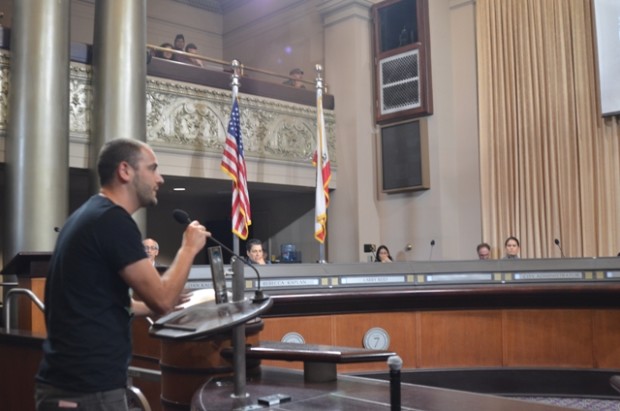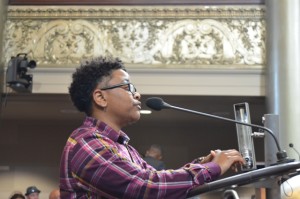City Council Mum After Exposure of Confidential Legal Opinion
Jul 11, 2015
Posted in Community, Economic Development, Gentrification, Housing/Foreclosures, Labor
Council ignored City Attorney’s advice that sale of Lake Merritt parcel was illegal

Josh Healey, an Eastlake resident, spoke Tuesday against the City Council’s decision to sell the East 12th property to a private developer. Photo by Tulio Ospina.
By Tulio Ospina and Ken Epstein
The Oakland City Council was uncharacteristically at a loss for words this week after public exposure that it had moved ahead on a controversial sale of city property near Lake Merritt to UrbanCore Development, ignoring the confidential legal opinion of its own attorney.
The council had approved the sale of the property in a 6-0 vote last month, and the motion was scheduled for final approval at Tuesday night’s council meeting and was expected to be a formality.

Robbie Clark speaks at City Council meeting.
But without a word of explanation, councilmembers pulled the final decision from the agenda. They never once referred to the exposure of the city attorney’s legal opinion, though it was discussed by a number of speakers at the meeting.
The final vote was postponed to the council’s July 21 meeting.
Oakland City Attorney Barbara Parker’s written opinion, issued on Feb. 17, had warned councilmembers their plan to sell the parcel across from the lake on East 12th Street to build a 315-unit luxury apartment tower would be in violation of state law – California’s Surplus Land Act.
In the confidential document that was obtained by the East Bay Express and released Monday, Parker told the council that the East 12th Street parcel “qualifies as surplus land, and the California Surplus Land Act requires the city to offer the property to ‘preferred entities’ designated in the act, for 60 days before agreeing to convey the property to UrbanCore.”
Under the law, the developer would be required “to rent or sell at least 15 percent of project units to lower income households at an affordable rent or housing cost,” according to the Parker’s written opinion.
The deal approved by the council on June 17 would sell the property to UrbanCore for $5.1 million, plus an additional $8 million to build other affordable housing elsewhere in Oakland with some additional community benefits. None of the units in the proposed building would be rented at a rate affordable to most Oakland residents.
One of those who spoke at the council meeting on Tuesday night was David Zisser, an attorney at Public Advocates, which is representing the community members who are fighting the sale of the property.
“We were not surprised by the city attorney’s opinion,” he said. “After all, we have been saying the same thing for months.”
“What is surprising is that the council decided to go ahead with the sale anyway,” he said, adding that he was glad councilmembers had pulled the property sale from the agenda.
Local resident Oscar Fuentes criticized City Attorney Parker, an elected official, for keeping silent – never revealing her legal opinion to the public.
“Wasn’t the city attorney obligated by her duty to the City of Oakland to give (the people) her actual interpretation of the law? I think the people deserve an answer,” he said.
Robbie Clark, an activist in local fights in opposition to gentrification and displacement, said that the council’s Lake Merritt property deal “is the kind of decision that helps gentrification continue.”
Instead of selling public property for private development, the city needs to “set aside land for affordable housing,” Clark said. “Those are the kinds of laws we need to enforce.”
“It’s hard to say we’re going to crack down on crime when some of that crime comes down from the city,” said Josh Healey, Eastlake resident.
One city hall observer stated, “Barbara Parker is supposed to be the city’s ultimate watchdog as city attorney. But since she is not seeking re-election, she doesn’t care enough to save taxpayers money and legal hardship.”
“If she were running again, she would be hyper-vigilant rather than denying the public its right to know what is going on,” according to the observer.
In an interview with the Post this week, Monica García, a member of the neighborhood group Eastlake United for Justice, spoke about her organization’s reaction to the exposure of Parker’s opinion.
“I’m shocked to see this in black and white, knowing that City Councilmembers went against their own legal opinion,” she said.
“As taxpayers, we want to know why they’d go against it,” she said, “It’s the taxpayers who pay every time the city loses a lawsuit.”
In addition to postponing the vote on the property sale, the council should “offer an explanation for why they chose to defy the legal opinion,” said García.
Opponents of the project have repeatedly told the council that the sale was in violation of the California Surplus Land Act and warned that a decision to go ahead with the sale would lead to a lawsuit.
Mayor Libby Schaaf – a member of the city council when a number of the decisions were made related to the sale of the parcel – did not respond to the Oakland Post’s request for a comment on the public exposure of Parker’s confidential opinion.